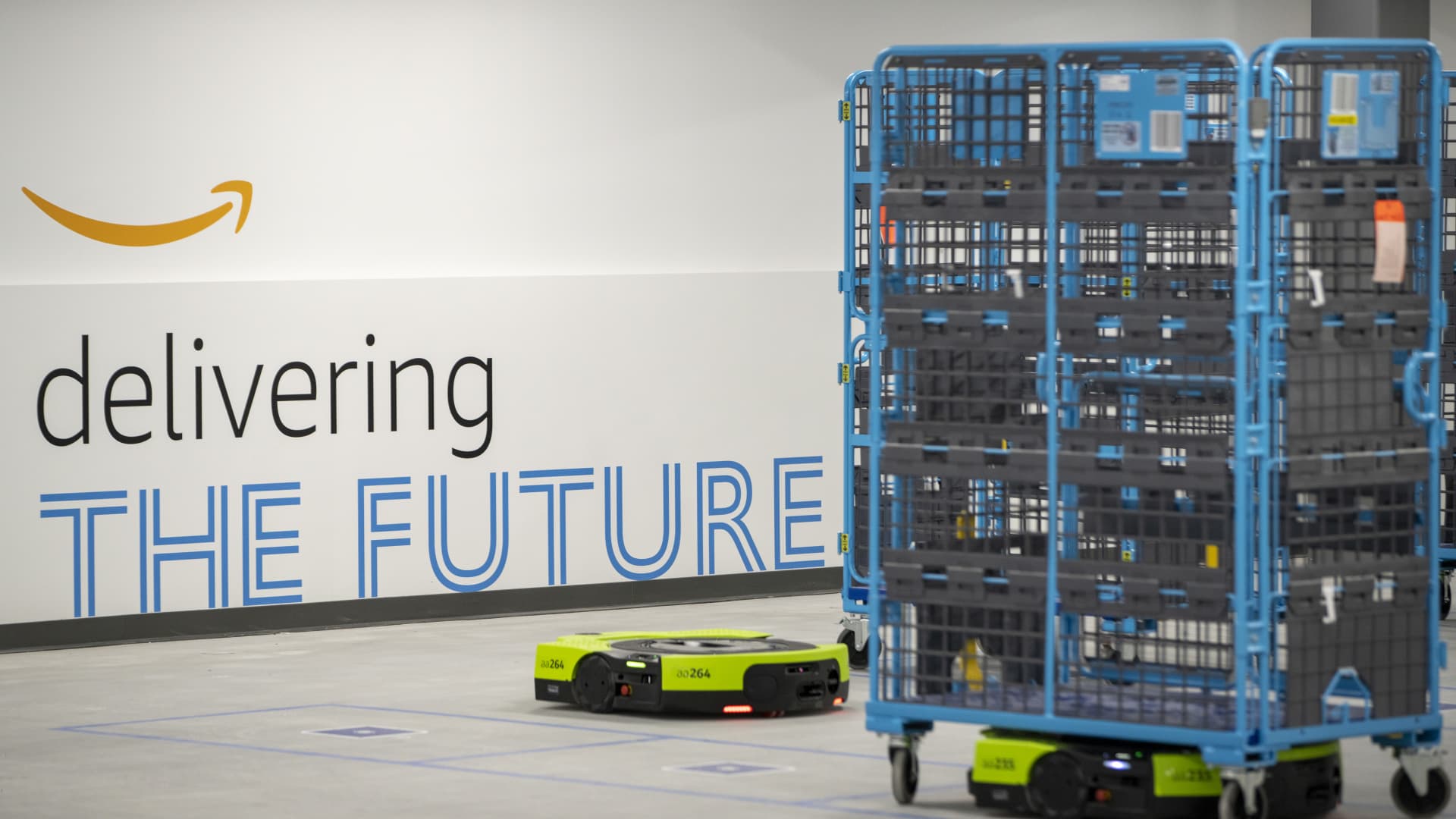The upcoming Peacock crime drama “Superfakes” has cast Ken Leung, Variety has confirmed.
The show was originally announced back in January with a series order, while Lucy Liu joined in the lead role in September. The…

The upcoming Peacock crime drama “Superfakes” has cast Ken Leung, Variety has confirmed.
The show was originally announced back in January with a series order, while Lucy Liu joined in the lead role in September. The…

New Cleveland Clinic research reveals that up to 5% of Americans – approximately 17 million people – carry genetic mutations or “variants” linked to increased cancer susceptibility, regardless of risk factors like personal or…

Victor Wembanyama leads the league in total fantasy points through week 1.
A memorable start to the season replete with multiple overtime clashes and wire-to-wire battles also featured plenty of explosive individual performances by a very…

Cryo-EM suspends purified and concentrated molecules in a super thin layer of water on a metal mesh grid that is frozen so fast in liquid nitrogen that it resembles glass because…

Researchers from Johns Hopkins Medicine and the Johns Hopkins Bloomberg School of Public Health report that an AI-powered lifestyle intervention app for prediabetes reduced the risk of diabetes similarly to traditional, human-led…

In the two decades following the end of the Second World War, the culture gods declared that families should be nuclear, which is not to say atomic, and that women, who had joined the work force in record numbers with men away in the military…

Amazon Proteus robots demonstrate autonomous navigation using barcodes on the floor during the Delivering the Future event at the Amazon Robotics Innovation Hub in Westborough, Massachusetts, US, on Thursday, Nov. 10, 2022.
Bloomberg | Bloomberg | Getty Images
Artificial intelligence is widening the productivity gap between large and small companies, lifting up bigger firms that are able to effectively scale the technology and cut costs tie to human workers.
Large-cap companies are seeing steady AI-related productivity gains since the release of OpenAI’s ChatGPT model in 2022 in terms of their real revenue per worker, according to Wells Fargo analysis. Small-cap names are witnessing a decline over the same period, meanwhile, the firm found.
“While productivity for the S&P 500 has soared 5.5% since ChatGPT, it’s down 12.3% for the Russell 2000,” Wells Fargo equity strategist Ohsung Kwon wrote in recent note to clients. “We see other examples of diverging trends in consumer, industrial, and financial markets.”
Wells Fargo analysis comparing real revenue per worker between Russell 2000 and S&P 500 indices
Wells Fargo
Breakthrough advancements in AI this year have led major corporations like Amazon to notably go all-in on the technology, finding ways to eliminate human roles that can be replaced by AI machines.
The performance of the S&P 500 versus the Russell 2000 small-cap index reflect this divergence in productivity gains. The broad market index is up 74% since ChatGPT’s 2022 launch, while the Russell is only up 39%.
The biggest U.S. companies have been internally deploying AI tools over the past few years to improve their productivity, supply chains and, in some cases, cut headcount. A World Economic Forum survey published at the start of 2025 found that roughly 40% of companies around the world expect to reduce their workforces over the next five years in roles where AI can automate tasks.
Layoffs this year have been on the rise with several big-name companies, including Target, Meta, Starbucks, Oracle, Microsoft and UPS, having announced significant, and sometimes historic, cuts to their total headcount. Companies have mostly cited efforts to streamline operations and growth strategy as reasons for cuts, but many are nodding to AI as part of the reason that human worker roles can be axed now or in the future.
For one, Amazon has been a leader in robot deployment across its facilities, which the e-commerce giant has said is improving costs and delivery times. The New York Times reported in October that Amazon executives believe the company is on track to replace more than half a million jobs with robots, which they believe will save about 30 cents on each item Amazon selects, packs and delivers to customers. Morgan Stanley believes Amazon’s robotics efforts can save the company between $2 billion and $4 billion by 2027.
Klarna, which has been among the most transparent in how AI is affecting its headcount, has shrunk its workforce by about 40%, in part due to its AI investments. CrowdStrike in May announced cuts to 5% of the company’s global workforce, citing AI efficiencies and saying that the technology “flattens our hiring curve.” IBM’s CEO has forecasted 30% of non-customer-facing roles to be cut by 2028 and told the Wall Street Journal earlier this year that AI chatbots have replaced 200 HR employees, freeing up investments to hire more people in sales and programming.
Palo Alto Networks, Walmart and McDonald’s are other companies that have notably been leveraging AI in ways that analysts expect will improve margins, we previously reported.
A September Intuit QuickBooks Small Business Insights survey of 5,000 small businesses in US, Canada, the UK, and Australia revealed that 68% of businesses have integrated AI into their daily operations, with roughly two-thirds reporting an increase in productivity.
“The numbers don’t lie,” Wells Fargo’s Kwon said in his report.

A new AI-powered tool that lets online shoppers “be their own detective” and spot the warning signs of scams has won praise from the UK’s fraud minister.
Scam Intelligence lets customers of the digital bank Starling upload images of items and ads on online marketplaces such as Facebook Marketplace, eBay, Vinted and Etsy, which it analyses for signs of fraud before serving up personalised advice “in seconds”.
Lord Hanson, the UK’s minister for fraud, told the Guardian that the “UK-first” tool launched by the bank was “a brilliant example of how industry can deploy AI to help us stay one step ahead of fraudsters”.
Scam Intelligence was built using Gemini, Google’s AI chatbot, in collaboration with Google Cloud, and was due to be unveiled at a fintech event in Las Vegas on Monday.
During testing it increased the rate at which customers cancelled payments by 300% – suggesting it has encouraged customers to pause and reflect before making a purchase.
The launch comes days after official figures revealed that the amounts of money lost to purchase scams have hit their highest level since the banking body UK Finance started collecting data in 2020.
With these scams, the victim pays in advance for goods or services – ranging from concert tickets and cars to mobile phones and holidays – that either do not exist or never arrive. This type of fraud usually involves the victim using an online platform such as an auction website or responding to a social media advert, said UK Finance.
Using Scam Intelligence, people can upload listings and messages from sellers on online marketplaces as well as images of items for sale. The tool can also analyse screenshots of texts and messages from potential scammers that are asking customers to transfer money.
If someone is trying to buy a bike on Facebook Marketplace, the tool might inform them that “we found some risks” – which might be that the price looks too good to be true, the photos are “generic or low-quality”, which means they could be stolen or fake, or the bank account details do not match the seller’s details. If a customer is trying to buy a guitar on eBay, it might flag the seller’s refusal to use eBay’s secure payment features. Similarly, if customers receive requests to transfer money before seeing an item in person, the tool could detect “pressure and urgency tactics”.
Armed with this intelligence, customers can then decide whether to continue with the purchase or not.
Harriet Rees, the chief information officer at Starling, said its new tool would help people “to spot the signs of scams themselves” and “be their own detective and investigator”.
after newsletter promotion
The bank indicated it believed the tool would be able to spot 90% of the “scam indicators” in an image.
It said that during testing, customers had tended to use it most for lower-value online marketplace items such as event tickets and trainers.
Starling said this was the first time a UK bank had offered an AI-powered scam detection tool in its app.
Customers have to opt in to take advantage of Scam Intelligence, and use of the tool is not mandatory.
This request seems a bit unusual, so we need to confirm that you’re human. Please press and hold the button until it turns completely green. Thank you for your cooperation!
This request seems a bit unusual, so we need to confirm that you’re human. Please press and hold the button until it turns completely green. Thank you for your cooperation!